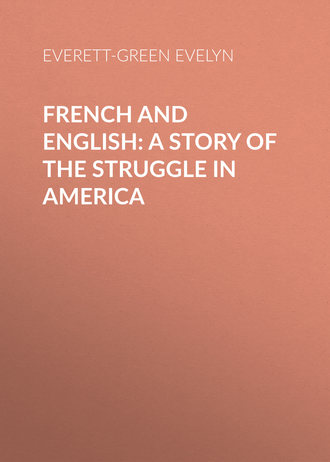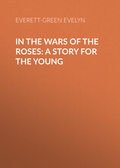
Everett-Green Evelyn
French and English: A Story of the Struggle in America
Chapter 4: In The Hour Of Victory
"Qui vive?"
It was the French sentry upon the shore, as the boats glided slowly by in the darkness. Julian was waiting for the challenge, and was ready with the answer.
"France!"
"A quel regiment?" came the voice again.
"De la Reine," answered Julian, who had not spoken in vain with the deserting Canadians, and knew a good deal about Bougainville's camp. Then afraid of being asked the password, he hastily added, still speaking French, "Have a care; the English will hear us! The provision boats from the camp!"
That hint was enough. The sentry knew that provision boats were expected, and that English vessels were anchored not far off. He let the fleet of English boats pass by in the darkness.
The strong current swept them along. Now they had reached the appointed place-passed it, indeed before they could get out of the current; but there was a narrow strand, wide enough for disembarkation, and the band of picked men who had volunteered for the task were already out, preparing to scale the lofty heights and see what lay beyond.
Up they went in the close darkness of the autumn night, the four-and-twenty selected men leading the way, closely followed by a larger band of comrades. No word was spoken, no cry was raised. The tense excitement of the moment seemed to preclude any such demonstration. It was believed that at this point there would be little resistance. There was no sentry on the shore, and no appearance of any camp along the top. It was believed that the French officer Vergor, with a small detachment of troops, was somewhere in the vicinity; but the renown of that worthy was not such as to check the ardour of the English troops.
Wolfe remained below, silent and motionless. His hands were locked together, and his pale face upturned towards the towering heights above. The gurgle and plash of the river was in his ears, mingled with those other sounds-the sounds of scrambling as his soldiers made their way up the rugged heights in the uncertain light of the waning stars. It was a moment never to be forgotten in his life. The presentiment of coming death was forgotten-everything was forgotten but the wild, strong hope of victory; and when from the top of the gorge there came at last the ring of a British cheer, the sound of brisk musket firing, and then another ringing shout as of triumph, the blood rushed into his white face, and he sprang from the boat on to the strand, exclaiming:
"They have won the foothold. Form up, men, and follow. We have England's honour in our keeping this day. Never let her say we failed her at the moment of greatest need."
It was a precipitous gorge up the sides of which the men had to climb. Julian looked anxiously up it and then at Wolfe, and said:
"It is too steep; do not try it. Let me find an easier path for you if I can."
He smiled as he scanned the sides of the gorge.
"I doubt if I shall get up," he answered; "but I mean to try."
And so strong was the resolution which inspired him that he found strength to drag himself up the steep declivity, with only a little assistance from Julian; and found himself, with the first breaking of the dawn, breathless, giddy, exhausted, upon the summit of those Heights of Abraham which today he was to make famous.
Instantly he took the command of the situation. Cannon were heard opening fire close on the left. It was the battery of Samos firing upon the English boats in the rear, now just visible in the broadening daylight.
"Silence that battery!" said Wolfe to an officer whose men were just forming up.
Their response was a cheer, as they moved away in orderly array; and when the distant battery of Sillary opened its mouth and uttered its menacing roar, there was another battalion ready to start off to capture and silence it. Soon the great guns uttered their voices no more. The English were masters of the coveted heights, and still their troops continued to land and clamber up to join their comrades upon the top.
The hearts of the soldiers beat high with pride and joy; but the face of Wolfe was inscrutable as he stood surveying the plain which formed a sort of tableland on the western side of the city of Quebec.
The town itself he could not see, though he knew where it lay, and how beyond it extended the camp of Beauport, from which Montcalm could march battalion after battalion to meet him in battle. He knew, too, that behind him lay Bougainville and his thousands, who, by joining in a concentrated action with Montcalm, could hem him in between two fires, and cut his gallant little army to pieces. He realized all this right well, if others did not, and knew that victory or death-even annihilation-lay before them. And knowing this, he made his survey of the place with a concentrated attention, and issued his orders without hesitation or delay.
The grassy plain was pretty level. Quebec bounded it on the east, the precipices on the St. Lawrence on the south, the declivities to the basin of the St. Charles on the north. In one place the plain-called the Plains of Abraham, from the old settler who once made a home there-was little more than a mile wide. When Wolfe reached it, he halted, and after a careful survey said:
"This will be the place to make our stand. Here we will meet our foe in battle. Fight they must now; and if heaven will grant us the victory, let the praise and glory of the day be to God above. If He think well to withhold His countenance from us, let us sell our lives as dearly as may be, and die sword in hand, with our face to the foe!"
Then the orders were issued. The brigades and battalions were marshalled into position. The Brigadiers received their orders from their young General, and took up the positions allotted to them. Each of them grasped him by the hand before quitting his side. To each one he spoke a word of praise for his gallantry during the tedious campaign, and of thanks for the personal friendship shown to one who felt so unworthy of it, having been so often a care and a trouble instead of a source of strength to those about him.
Julian stood near, a strange mistiness before his eyes; and as Fritz turned away to take up his position at the head of his men, he said in a husky voice to his friend:
"You will stay beside him and guard him from ill. I know not why, but my heart is full of misgiving. Quebec will be dearly won if it lose us the gallant Wolfe!"
"He will not think so," said Julian. "And his life has been so full of trouble and pain. I think few know how he has suffered. Perhaps there is some truth in the old heathen saying, 'Those whom the gods love die young.' Perhaps it has a better fulfilment and significance now that the Light has come into the world, and that there is no sting now in death."
They pressed each other by the hand, and Fritz swung away. It was a moment of deep though suppressed emotion. Both men knew that they might have looked their last upon the face of the other, and after many years of close and brother-like companionship such partings cannot be without their thrill of pain and wonder.
"Why must these things be?" spoke Julian, beneath his breath. "Why must men stand up to kill and be killed? How long will it be before the reign of the Prince of Peace, when all these things shall be done away?"
Light showers were scudding over the landscape, sometimes blotting out the view, sometimes illumined by shafts of golden sunlight, which gave a curious glory to the scene. The battle was set in array. Every disposition which military genius could suggest had been made to avoid surprise or outflanking or any other peril. Puffs of smoke from over the plains denoted the presence of ambushed Indians or Canadians, and skirmishers were scouring hither and thither to dislodge any parties who approached unpleasantly near.
The soldiers were bidden to lie down, to be safer from accident, and to rest themselves in preparation for what was coming. The main body of the army was quiet, but to the left, where some woods and houses gave cover to the enemy, the fire be came galling, and some light infantry were sent out to make an end of the foes there, to take and burn the houses and scatter the marksmen.
This was successfully done, and again there was quiet. Wolfe, who seemed to be everywhere at once, went round the field once again, cheered lustily wherever he appeared; grave, watchful, with the air of a man who knows that the crisis of his life is at hand, and that upon the issue of the day hang results greater than he can reckon or comprehend.
It was about ten in the morning before his quick eye saw signs that the enemy was at last advancing to take up the gage of battle so gallantly thrown down. Hitherto the French had succeeded in avoiding a pitched encounter with their foe; now they must fight, or have their city hopelessly cut off from the basis of their supplies. Wolfe knew that at last the hour had come, and his pale face flushed with a strange exultation as he saw the first white lines advancing towards him.
"At last!" he exclaimed-"at last! We have waited many months for this moment; now that it has come, pray Heaven we may strike a blow for England's honour which France shall never forget!"
Julian's attention was distracted by the sight of a little knot of men coming slowly towards the rear, where the surgeons were stationed to care for the wounded, who were to be carried there when possible.
"It is Fritz!" he exclaimed; "he has been wounded!"
Wolfe uttered an expression of concern, and stepped forward to inquire. It had been the regiment in command of Fritz which had been sent to silence the sharpshooters in the farms and copses. John Stark had gone with him, their former life as Rangers having well qualified them for this species of warfare. Fritz was now being led back, white and bloody, one ball having lodged in his shoulder, and another in his foot. He walked with difficulty, supported by two of his men.
"I am grieved to see you so!" cried Wolfe, with the ready concern he showed in any sufferings not his own.
"It is naught," answered Fritz, faintly but cheerfully; "I would care no whit but that it will keep me from the fight.
"I have left John Stark in command, sir," he added to the General; "the men are perfectly steady when he directs their movements."
Wolfe nodded. He knew the intrepidity and cool courage of the Ranger. There would be no blundering where Stark held the command.
"Care for your patient well," said the young General to a surgeon who came hurrying up at the moment; "Captain Neville is too good a soldier and officer for us to lose."
Then turning to Humphrey, who was acting in the capacity of aide-de-camp, he said in a quick undertone:
"If anything should happen to me in the battle, let Brigadier Moncton know that I recommend Captain Neville for promotion."
Then he turned his attention towards the oncoming tide of battle, knowing that the great crisis for which he had been waiting all these long months was now upon him.
The French were forming up along the opposite ridge, which hid the city from view. Wolfe took in their disposition at a glance, and a grim smile formed itself upon his lips. He saw that though the centre of the three bodies forming up into order was composed entirely of regular troops, both flanks were regulars intermixed with Canadians; and for the Canadian militia in the open he had an unbounded contempt. Moreover, he noted that instead of waiting until they were in good and compact order, they began almost immediately to advance, and that without any of the method and precision so necessary in an attack upon a well-posted and stationary foe.
He passed along the word of command to his own officers, instructing them how to act, and stood watching with the breathless intensity of a man who knows that the crisis of a mighty destiny is at hand.
The moment the French soldiers got within range they commenced to fire; not as one man, in a crashing volley, but wildly, irregularly, excitedly, uttering cries and shouts the while-a trick caught from their Indian allies, who used noise as one of their most effective weapons.
"Bah!" cried Wolfe, with a sudden exclamation of mingled contempt and amusement; "look there! Saw you ever such soldiers as these?"
Those about him looked, and a hoarse laugh broke from them, and seemed to run along the ranks of immovable red-coats drawn up like a wall, and coolly reserving their fire.
The gust of laughter was called forth by the action of the Canadian recruits, who, immediately upon discharging their pieces, flung themselves down upon the ground to reload, throwing their companions into the utmost confusion, as it was almost impossible to continue marching without trampling upon their prostrate figures.
"I would sooner trust my whole fate to one company of regulars," exclaimed Wolfe, "than attempt to fight with such soldiers as these! They are fit only for their native forests; and were I in command, back they should go there, quick march."
Yet still the oncoming mass of French approached, the dropping fire never ceasing. Nearer and nearer they came, and now were not fifty paces distant from the English lines.
"Crash!"
It was not like a volley of musketry; it was like a cannon shot. The absolute precision with which it was delivered showed the perfect steadiness and nerve of the men. Upon Wolfe's face might be seen a smile of approbation and pride. This was the way English soldiers met the foe; this was the spirit in which victory was won.
Another crash, almost as accurate as the first, and a few minutes of deafening clattering fire; a pause, in which nothing could be seen but rolling clouds of smoke; and then?
The smoke rolled slowly away, and as the pall lifted, a wild, ringing cheer broke from the English ranks, mingled with the yell of the Highlanders beyond. The ground was covered with dead and wounded; the ranks of the oncoming foe were shattered and broken. The Canadians had turned, and were flying hither and thither, only caring to escape the terrible fire, which in open country they could never stand. In a few more seconds, as soon as the regulars saw that the red-coats were preparing to charge, they too flung down their muskets and joined the rout.
"Charge them, men, charge them!"
Wolfe's voice rang like a clarion note over the field. He placed himself at the head of one of the columns. Julian and Humphrey were on either side of him. The yell of the Highlanders was in their ears, and the huzzah of the English soldiers, as they dashed upon the retreating foe.
Their line had been a little broken here by the fire of the foe, and still from ambushed sharpshooters hidden upon the plain a more or less deadly fire was kept up. Wolfe led where the danger was greatest and the firing most galling and persistent.
"Dislodge those men!" was the order which had just passed his lips, when Julian noticed that he seemed to pause and stagger for a moment.
"You are hurt!" he exclaimed anxiously, springing to his side; but Wolfe kept steadily on his way, wrapping his handkerchief round his wrist the while. The blood was welling from it. Julian insisted upon tying the bandage, finding that the wrist was shattered.
"You are wounded-you will surely go back!" he said anxiously; but Wolfe seemed scarcely to hear.
The next moment he was off again with his men, directing their movements with all his accustomed skill and acumen. Once again he staggered. Julian dashed to his side; but he spoke no word. If he would but think of himself! But no; his soul was in the battle. He had no care save for the issue of the day.
A sudden volley seemed to open upon them from a little unseen dip in the ground, masked by thick underwood. Julian felt a bullet whiz so near to his ear that the skin was grazed and the hair singed. For a moment he was dizzy with the deafening sound. Then a low cry from Humphrey reached him.
"The General! the General!" he said.
Julian dashed his hand across his eyes and looked. Wolfe was sitting upon the ground. He was still gazing earnestly at the battle rushing onward, but there had come into his eyes a strange dimness.
"He is struck-he is wounded!" said Humphrey in a low voice, bending over him. "Help, Julian; we must carry him to the rear."
Julian half expected resistance on the part of Wolfe; but no word passed his lips. They were growing ashy white.
With a groan of anguish-for he felt as though he knew what was coming-Julian bent to the task, and the pair conveyed the light, frail form through the melee of the battlefield towards the place where the wounded had been carried, and where Fritz still lay. A surgeon came hastily forward, and seeing who it was, uttered an exclamation of dismay.
Wolfe opened his dim eyes. He saw Julian's face, but all the rest was blotted out in a haze.
"Lay me down," he said faintly; "I want nothing."
"The surgeons are here," said Julian anxiously as they put him out of the hot rays of the sun, which was now shining over heights and plains.
"They can do nothing for me," said Wolfe, in the same faint, dreamy way; "let them look to those whom they can help."
A death-like faintness was creeping over him. The surgeon put a stimulating draught to his lips; and when a part had been swallowed, proceeded to make a partial examination of the injuries sustained. But when he had opened the breast of his coat and saw two orifices in the neighbourhood of the heart, he shook his head, and laid the wounded man down to rest.
Julian felt a spasm of pain shoot through his heart, like a thrust from a bayonet.
"Can you do nothing?" he asked in a whisper.
"Nothing," was the reply. "He has not an hour to live."
"To be cut off in the very hour of victory!" exclaimed Humphrey, with a burst of sorrow. "It is too hard-too hard!"
"Yet it is what he desired for himself," said Julian, in a low voice. I think it is what he himself would have chosen."
"He has suffered more than any of us can well imagine," said the surgeon gravely. "We can scarcely grudge to him the rest and peace of the long, last sleep."
Humphrey turned away to dash the tears from his eyes. In his silent, dog-like fashion, he had loved their young General with a great and ardent love, and it cut him to the heart to see him lying there white and pulseless, his life ebbing slowly away, without hope of a rally.
A sign from somebody at a little distance attracted his attention. He crossed the open space of ground, and bent over Fritz, who lay bandaged and partially helpless amongst the wounded, but with all his faculties clear.
"What is it they are saying all around?" he asked anxiously. "How goes the battle? how is it with our General?"
"The battle truly is won-or so I believe," answered Humphrey, in a husky voice. "God grant that the gallant Wolfe may live to know that success has crowned his efforts-that the laurel wreath will be his, even though it be only laid upon his tomb!"
"Is he then wounded?"
"Mortally, they say."
A spasm of pain contracted Fritz's face.
"Then Quebec will be dearly purchased," he said. "Humphrey, help me to move; I would look upon his face once again!"
Humphrey gave the desired assistance. They were bringing in the wounded, French and English both, to this place of shelter; but the spot where Wolfe lay was regarded as sacred ground. It was still and quiet there, though in the distance the din of battle sounded, and the sharp rattle of musketry or the booming of artillery could be heard at this side and that.
Fritz limped slowly across the open space, and halted a dozen paces from where Wolfe lay; half supported in the arms of Julian, whose face was stern with repressed grief.
The ashen shadow had deepened upon the face of the dying man. He seemed to be sinking away out of life. The long lashes lay upon the waxen cheek; the deep repose of the long, last sleep seemed to be falling upon the wasted features. Fritz felt an unaccustomed mist rising before his eyes. He thought he had never before seen a nobler countenance.
The few standing about the wounded General looked from him to the distant plain, where the battle tide was rolling farther away, and from which, from time to time, arose outbursts of sudden sound-the wild screech of the Highlanders, the answering cheer of the English, the spattering, diminishing shots, and now and again a sharp volley that told of some more determined struggle in one place or another.
"Look how they run! look, look-they run like sheep!" cried Humphrey, breaking into sudden excitement, as his trained sight, without the aid of glasses, took in the meaning of that confused mass of men.
Julian felt a thrill run through the prostrate form he was holding. The eyes he had never thought to look upon again opened wide. Wolfe raised his head, and asked, with something of the old ring in his voice:
"Who run?"
"The enemy, sir," eagerly replied those who stood by. "They are melting away like smoke. They give way everywhere. The day is ours!"
The young General half raised himself, as though he would fain have seen the sight; but his dim eyes took in nothing.
"Tell Colonel Burton," he said, speaking with his old decision, "to march Webb's regiment down to the St. Charles, and cut off their retreat from the bridge."
Humphrey was off almost before the words had left his lips. He would be the one to carry the General's last message. Wolfe heard him go, and smiled. He knew that Humphrey was the trustiest of messengers. He looked up into Julian's face.
"Now lay me down again," he said faintly. "Farewell, my trusty friend and comrade. Take my love to those at home; remember my last messages. God be thanked; He has given us the victory. I can die in peace."
He drew a long sigh, and his eyes closed. A little thrill ran through the worn frame.
Julian laid it down, and reverently covered the peaceful face; whilst a stifled sob went up from those who saw the action.
James Wolfe had gone to his rest-had died the death of a hero upon the victorious battlefield.







